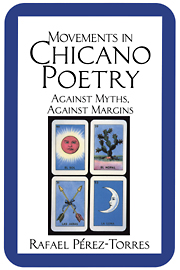Book contents
- Frontmatter
- Contents
- Acknowledgments
- 1 Introduction: Movements in a “Minority” Literature
- PART I THE POSTCOLONIAL
- 2 Four or Five Worlds: Chicano/a Literary Criticism as Postcolonial Discourse
- 3 From the Homeland to the Borderlands, the Reformation of Aztlán
- 4 Locality, Locotes, and the Politics of Displacement
- PART II THE POSTMODERN
- PART III CONFLUENCES
- Notes
- Works Cited
- Index
- CAMBRIDGE STUDIES IN AMERICAN LITERATURE AND CULTURE
3 - From the Homeland to the Borderlands, the Reformation of Aztlán
Published online by Cambridge University Press: 17 September 2009
- Frontmatter
- Contents
- Acknowledgments
- 1 Introduction: Movements in a “Minority” Literature
- PART I THE POSTCOLONIAL
- 2 Four or Five Worlds: Chicano/a Literary Criticism as Postcolonial Discourse
- 3 From the Homeland to the Borderlands, the Reformation of Aztlán
- 4 Locality, Locotes, and the Politics of Displacement
- PART II THE POSTMODERN
- PART III CONFLUENCES
- Notes
- Works Cited
- Index
- CAMBRIDGE STUDIES IN AMERICAN LITERATURE AND CULTURE
Summary
This is the place where everyone takes command:
No man's land.
– Latin AllianceIn Delano, California, in 1965, a procession of campesinos walked away from the heat and dust of non-unionized grape fields into the stark sun of historical scrutiny. The group, organized and led by César Chávez, demanded the right to fair wages, legal protection, and decent working conditions – “basic, God-given rights as human beings.” These demands were outlined in “El Plan de Delano” issued by the National Farm Workers Association (NFWA, later to become the United Farm Workers, UFW). On September 16, 1965, the NFWA voted to join Filipino grape pickers in their strike against wealthy landowners. As one of its first actions, the group undertook a 250-mile pilgrimage to Sacramento, during which “El Plan de Delano” was issued: “Our sweat and our blood have fallen on this land to make other men rich. This Pilgrimage is a witness to the suffering we have seen for generations” (1965: 198).
“Land,” once again in the history of the poor and dispossessed, sparked demands for reform and change. “Land” again incited the sense of lightness and passion for justice necessary in engendering political action. The strike in Delano triggered the events known variously as El Movimiento or La Causa and incited calls for justice and empowerment that, variously muted or amplified, are still sounded today.
- Type
- Chapter
- Information
- Movements in Chicano PoetryAgainst Myths, against Margins, pp. 56 - 96Publisher: Cambridge University PressPrint publication year: 1995

